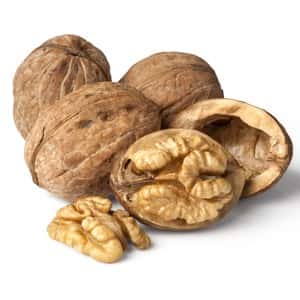
The Food and Drug Administration once chastised a California walnut growers cooperative for promoting the health benefits of their nuts. In its strange bureaucratic logic the federal agency determined that Diamond Foods was promoting its walnuts as “drugs.”
Negative on Nuts:
The FDA has been negative on nuts for decades. That’s because nuts are high in fat and in the era of fat phobia, the federal watchdog thought it was protecting the public health by discouraging nut consumption.
What’s Wrong with Walnuts?
Take walnuts, for example. Back on February 22, 2010, the FDA sent a warning letter to a walnut growers’ cooperative (Diamond Foods). The feds objected to the statement on the co-op website: “Every time you munch a few walnuts, you’re doing your body a big favor.” The website had listed a number of benefits derived from omega-3 fats found in walnuts.
The Health Benefits of Nuts:
Research shows that omega-3 fats can improve cholesterol levels (Journal of the American Heart Association, Jan. 26, 2016). As long ago as July, 1992, there was evidence that nut consumption in general and walnuts in particular could protect people against heart attacks (Archives of Internal Medicine).
The FDA was not interested in that data, however.
In its warning letter to Diamond Foods in 2010, it concluded:
“Because of these intended uses, your walnut products are drugs…Thus, your walnut products are also misbranded…in that the labeling for these drugs fails to bear adequate directions for use…”
You really should read the letter from the FDA for yourself, though you may find it hard to believe.
Many of our readers were astonished at this bureaucratic baloney. As one put it, “Who knew you had to have directions to eat walnuts?”
The FDA Goes After KIND Bars:
Fast forward to March 17, 2015. The FDA sent a warning letter to the makers of KIND bars. These snacks contain almonds, peanuts, cashews and walnuts and are low in sugar and sodium. The company used the phrase “healthy and tasty” to describe its nut bars. Because nuts are high in saturated fat, the feds said that the nutrient content claim “healthy” was inappropriate.
The company fought back and filed a petition with the agency to reevaluate its outdated definition of “healthy.” Thankfully, the FDA is beginning to reassess its position on fat and healthful nutrition. It rescinded the prohibition on KIND’s use of the word healthy. Even more significant, though, is the possibility that labeling requirements in the future will be more in tune with current nutrition science rather than sticking to the 1990s idea that fat should be minimized above all.
Proof That Nuts Are “Healthy”:
One of the most important nutrition studies in recent years (PREDIMED) was a randomized controlled trial conducted in Spain (New England Journal of Medicine, April 4, 2014). The researchers concluded that “A Mediterranean diet supplemented with extra virgin olive oil or nuts reduced the incidence of major cardiovascular events.” The subjects who consumed a handful of nuts daily or large quantities of olive oil were able to reduce their likelihood of having a heart attack by 30 percent.
FDA Also Goes After Cherries and Pomegranates:
If you think the FDA has been squirrelly about nuts, you should read its position on tart cherries and pomegranate juice. Here are links to our thoughts on the question: “Are Walnuts and Cherries Really Drugs” and “Is Life Just a Bowl of Tart Cherries?”
Nuts for Good Health:
The old idea that a low saturated fat diet is healthy has been discredited in numerous studies, including a recent analysis of old data from the Minnesota Coronary Experiment (BMJ, online, April 12, 2016). We’re delighted that the FDA is finally catching up with modern nutrition science. This should help Americans make better decisions on what they eat for good health…including nuts!

